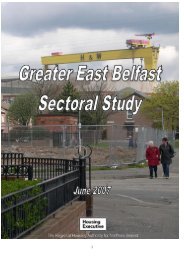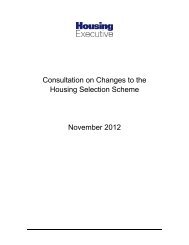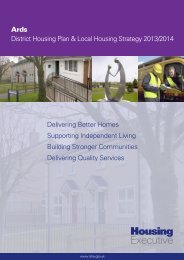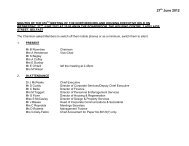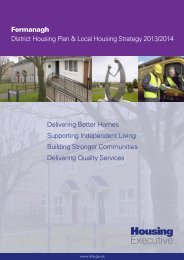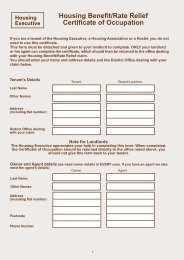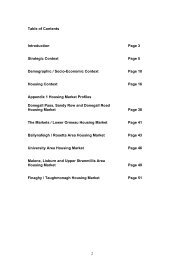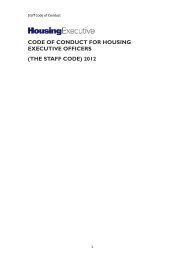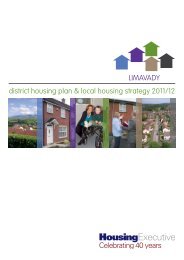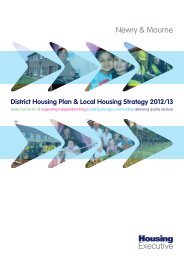Student Housing Guide - Northern Ireland Housing Executive
Student Housing Guide - Northern Ireland Housing Executive
Student Housing Guide - Northern Ireland Housing Executive
Create successful ePaper yourself
Turn your PDF publications into a flip-book with our unique Google optimized e-Paper software.
<strong>Student</strong><br />
houSing<br />
guide
While every effort has been made to ensure the<br />
accuracy of the information contained in this<br />
publication, it should not be regarded as a definitive<br />
statement of the law.
Introduction<br />
Finding a cheap, comfortable roof<br />
over your head is never easy.<br />
However, when renting, knowing what<br />
to look out for and understanding<br />
exactly what you are agreeing to is half<br />
the battle!<br />
If you have any problems with your<br />
housing, your students’ union welfare<br />
office and college accommodation<br />
office are there to help. So too are<br />
the agencies listed at the back of this<br />
booklet.<br />
This brochure has been produced<br />
by the NUS-USI <strong>Student</strong> Movement,<br />
<strong>Housing</strong> Rights Service and the<br />
<strong>Northern</strong> <strong>Ireland</strong> <strong>Housing</strong> <strong>Executive</strong>, in<br />
consultation with Queen’s University<br />
Belfast and the University of Ulster.<br />
Remember<br />
If you like a particular property<br />
but the landlord decides not to<br />
rent to you, they are entitled to<br />
do so. However where you feel<br />
you have been denied access to<br />
accommodation because of disability,<br />
race, religion, gender or sexual<br />
orientation this may contravene<br />
anti-discriminatory legislation and<br />
you should seek advice from your<br />
students’ union welfare officer or<br />
NUS-USI.
UNIVERSITY<br />
& COLLEGE<br />
Most universities and some further<br />
education colleges are able to offer some<br />
accommodation of their own. Priority is<br />
usually given to first year students, students<br />
with a disability and international students.<br />
Contact the accommodation office of the<br />
university or college concerned.<br />
The most common arrangement is a single<br />
study bedroom with access to kitchen<br />
facilities, known as ‘single self-catering’.<br />
In addition, some universities and colleges<br />
have accommodation that offers a certain<br />
number of meals (eg breakfast and evening<br />
meal). Some will also own or manage<br />
houses which they rent to students on a<br />
shared basis.<br />
Costs<br />
Rent levels vary depending on the types of<br />
accommodation. Make sure you can afford<br />
the accommodation.<br />
The rent may include the cost of heat and<br />
light, but check to make sure. In addition,<br />
a deposit may be needed to cover any<br />
damages or other costs. Most institutions<br />
will return the deposit at the end of the<br />
letting period, but some do not.<br />
Remember<br />
Do not pay any money until you decide to<br />
accept the property. If you are asked to pay<br />
money to an agent, then this may be illegal<br />
and you should seek advice.<br />
PRIVATE<br />
SECTOR<br />
There are several places to start looking:<br />
• www.nistudentpad.co.uk<br />
• student union/college notice board<br />
• newsagents’ window<br />
• newspaper to let ads<br />
• estate agents<br />
nistudentpad.co.uk is a comprehensive and<br />
constantly changing database of private and<br />
university properties available in <strong>Northern</strong><br />
<strong>Ireland</strong> and the UK.<br />
housingadviceni.org (<strong>Housing</strong> Rights<br />
Service) provides advice on private rented<br />
accommodation.<br />
Houses in Multiple Occupation (HMO)<br />
A shared property is called a House in<br />
Multiple Occupation (HMO). It means the<br />
property has to meet certain standards and<br />
the property manager must comply with the<br />
HMO Management Regulations. Ask if the<br />
house is HMO Registered with the <strong>Housing</strong><br />
<strong>Executive</strong>.<br />
For advice on HMOs visit: nihe.gov.uk/hmo<br />
AnServe is a 24/7 answering service for<br />
incidents relating to HMO registered<br />
properties: 08000 213 155<br />
SHAC <strong>Housing</strong> Association<br />
SHAC offers students and young people quality<br />
accommodation across <strong>Northern</strong> <strong>Ireland</strong>.<br />
Costs<br />
Private landlords are very unlikely to include<br />
the costs of heat and light within the rent.<br />
Tenants are also expected to pay a month’s<br />
rent in advance and a deposit that can be the<br />
equivalent of a month’s rent.
<strong>Housing</strong> Benefit is not<br />
generally available to<br />
students. However, if you<br />
have dependant children<br />
or are disabled or are<br />
entitled to other social<br />
security benefits, you may<br />
be eligible for <strong>Housing</strong><br />
Benefit.<br />
Check out your eligibility<br />
with your students’<br />
union or nearest <strong>Housing</strong><br />
Benefit office.
LETTING AGREEMENTS &<br />
LEGAL RIGHTS<br />
Letting agreements<br />
Regardless of the type of accommodation,<br />
you will generally be asked to sign a letting<br />
agreement. These place you under a<br />
contractual obligation to comply with all the<br />
points of that agreement.<br />
A clause is often included which prevents<br />
you moving out of the accommodation until<br />
a new tenant has been found; until then,<br />
you could remain liable for the rent.<br />
All agreements must be read thoroughly<br />
before being signed.<br />
Most students will be living in private rental<br />
accommodation with basic legal rights.<br />
If you experience problems, seek advice<br />
(see the list of agencies at the back of this<br />
booklet) as soon as possible.<br />
Legal rights<br />
As a tenant you have the right to:<br />
• A rent book<br />
A legal requirement that includes the<br />
name, address and phone number of<br />
the landlord and agent, rent payable<br />
(and rates if applicable) when it’s due,<br />
and details of any other payments you<br />
are required to make. (See Appendix 3).<br />
A rent book must be provided within<br />
28 days of a tenancy commencing. The<br />
local council environmental health<br />
department enforces this law. For a<br />
sample of a rent book go to:<br />
nihe.gov.uk/rent_book.pdf<br />
• Freedom from harassment and illegal<br />
eviction<br />
This includes cutting off your electricity<br />
or water supply, changing the locks,<br />
interfering with your possessions or<br />
threatening behaviour. Harassment may<br />
also include a landlord turning up at the<br />
property unannounced. The landlord<br />
must be allowed reasonable access<br />
to the house, to inspect and carry out<br />
repairs or in emergency situations. You<br />
must be given reasonable notice of their<br />
visit, ideally at least 24 hours. Always seek<br />
advice immediately. The environmental<br />
health department of your local council<br />
has powers to investigate such actions.<br />
• Notice to quit<br />
All tenants have the right to at least 4<br />
weeks written notice to quit before any<br />
court action to evict can start. If you have<br />
lived in the property for five years or more<br />
you may be entitled to a longer period.<br />
• Due process of law<br />
If a landlord terminates your tenancy,<br />
and you refuse to move out, the<br />
landlord can only recover possession<br />
through court proceedings. If they try to<br />
evict you without a court order then this<br />
could be an illegal eviction.<br />
• Default tenancy term of 6 months<br />
Where the length of the tenancy has not<br />
been agreed at the outset, the law says that<br />
the tenancy must last for at least 6 months.<br />
• Default repair obligations<br />
Where it is not clear who is responsible<br />
for carrying out repairs, the law sets out<br />
default repairing obligations for both<br />
you and your landlord.
Remember:<br />
Some landlords or<br />
agents may ask you to<br />
provide a guarantor.<br />
this is someone who<br />
guarantees to make<br />
payments if you fail to<br />
do so yourself.<br />
Failure by either you<br />
as the tenant to make<br />
payments, or your<br />
guarantor to make<br />
payments (following<br />
your failure to do so),<br />
could result in either<br />
of you being pursued<br />
for the money in the<br />
Small Claims Court.
Belfast City Council environmental health<br />
(028) 9027 0428<br />
belfastcity.gov.uk/environmentalhealth<br />
Can provide home safety checks which<br />
reduce your risk of having an accident at<br />
home. They offer free home safety checks<br />
for residents within the Belfast area,<br />
particularly seniors and parents with young<br />
children.<br />
The checks offer tips on all aspects of home<br />
safety, as well as specialist advice on topics<br />
like heating and energy saving.<br />
A room-by-room inspection usually takes<br />
around 30 minutes and all checks are<br />
carried out by two uniformed members of<br />
staff with identity cards.<br />
Repairs<br />
Check your tenancy agreement to see who<br />
is actually responsible for the repair. Never<br />
assume it is the landlord’s responsibility.<br />
Remember also that if you do not have<br />
a tenancy agreement or if your tenancy<br />
agreement does not set out who is<br />
responsible for carrying out repairs then<br />
default repairing obligations will apply<br />
(www.dsdni.gov.uk/repair).<br />
If, however, you discover that the landlord<br />
is responsible and they have failed to carry<br />
out the repairs you have told them about,<br />
contact the <strong>Housing</strong> <strong>Executive</strong>’s HMO Unit<br />
or the environmental health department of<br />
your local council if the disrepair represents<br />
a danger to your health and/or safety.<br />
For advice on repair obligations go to:<br />
dsdni.gov.uk/repairs.pdf<br />
Remember<br />
As a tenant you have certain basic rights.<br />
However, you also have responsibilities to<br />
the landlord, your flatmates and the local<br />
community in which you live.<br />
Be a good neighbour<br />
Be reasonable in your behaviour. You should<br />
be aware that your university, landlord and/<br />
or police can take disciplinary action against<br />
you for anti-social behaviour and you could<br />
also end up with a criminal record.<br />
Leaving before the tenancy<br />
agreement has expired<br />
If you move out before the period of<br />
the tenancy agreement has expired, the<br />
landlord will still expect and be legally<br />
entitled to the full rent agreed at the<br />
outset. You should seek advice from your<br />
students’ union welfare office/college<br />
accommodation office. The landlord may<br />
permit you to arrange a replacement tenant<br />
to prevent any financial loss.<br />
Getting your deposit back<br />
If you paid a returnable deposit, and if there<br />
is no rent outstanding and no breakages etc,<br />
the deposit must be returned, in full, at the<br />
end of the tenancy.<br />
Reasonable wear and tear cannot be used<br />
as grounds for withholding all or part of<br />
your deposit. If the deposit is withheld<br />
without good reason by the landlord<br />
at the end of the tenancy, seek advice<br />
immediately. <strong>Housing</strong> Rights Service can<br />
provide advice to you about taking an action<br />
in the Small Claims Court.<br />
If you want to move out before the end<br />
of the agreed tenancy period, getting any<br />
deposit back may be a problem and you<br />
should seek specialist advice.
SAFETY<br />
Carbon monoxide<br />
Over the last decade a number of students<br />
have died and thousands have become<br />
ill as a result of being poisoned by silent,<br />
odourless carbon monoxide fumes from<br />
faulty gas appliances and solid fuel room<br />
heaters. Regulations state that all landlords<br />
must have their gas appliances checked for<br />
safety every twelve months. They should<br />
provide all tenants with a copy of the safety<br />
check record, visit: hseni.gov.uk<br />
NUS-USI advise that you demand this<br />
evidence from your landlord/agent. If you<br />
have any concerns, contact the <strong>Housing</strong><br />
<strong>Executive</strong> HMO Unit 03448 920 900.<br />
For advice on carbon monoxide:<br />
hseni.gov.uk/watchout<br />
Fire, furniture and electrical<br />
• Make sure that an automatic (electric)<br />
fire detection and alarm system (or<br />
smoke detectors) has been fitted in<br />
appropriate places within the property,<br />
and check to see that there are fire<br />
blankets and a fire extinguisher in<br />
the kitchen. Do not tamper with this<br />
equipment - it could save your life!<br />
• All furniture and furnishings should be<br />
made from fire resistant materials with a<br />
compliance label attached.<br />
• Check all electrical plug sockets for<br />
signs of damage, and that there are<br />
sufficient socket outlets for your needs.<br />
Personal safety<br />
When viewing property always take<br />
someone along with you or inform a friend<br />
about your plans. If asked to pay a deposit<br />
by the landlord/agent, ensure you get a<br />
receipt as well as contact details.
ACCEPTING A<br />
PROPERTY<br />
Take your time and do not be harassed into<br />
accepting the first property you see.<br />
Many of the best flats/bedsits or houses are<br />
passed on through personal contact and<br />
it may be possible to ‘take-over’ a tenancy<br />
from friends or other students, provided the<br />
landlord agrees to this in advance.<br />
Once you are satisfied with the<br />
accommodation and the nature of the<br />
tenancy agreement between you and the<br />
landlord, you should then make sure you<br />
obtain the following:<br />
• A copy of the tenancy agreement/lease<br />
and any other document(s) you have<br />
signed - read carefully as your tenancy<br />
agreement is a legally binding contract.<br />
• The name, address and phone number<br />
of your landlord.<br />
• A rent book - this is a legal requirement.<br />
• Details of any payments, other than the<br />
rent, which you will be required to make<br />
e.g. rates.<br />
• A furniture inventory (Checklist 2). This<br />
is a list of all the contents, furniture,<br />
etc in the property. If you have already<br />
been given an inventory, check through<br />
it and note any items which are missing<br />
or damaged. If no inventory is provided,<br />
draw up your own list. Sign and date<br />
it, give a copy to the landlord. This is<br />
important if any dispute arises as to<br />
damage/loss etc, and in the event of the<br />
landlord withholding your deposit.
CHECKLIST 1 - Finding a place to live<br />
Take this checklist with you when you are<br />
house hunting. There are a number of<br />
important things to look out for. You should<br />
be satisfied about the following:<br />
The Neighbourhood<br />
Is it convenient? Check out the public<br />
transport.<br />
Are there good local shops with late<br />
opening hours, community/recreational<br />
facilities in the area?<br />
Is there good street lighting? If you are<br />
concerned as to how ‘safe’ the area is,<br />
check with your students’ union welfare<br />
office.<br />
The Accommodation<br />
Are there signs of dampness?<br />
How much furniture is provided? Is it<br />
adequate? What condition is it in? Does<br />
it meet current fire safety regulations?<br />
What form of heating is supplied? Is it<br />
working? Will the accommodation be<br />
easy to heat?<br />
What cooking facilities are available?<br />
Is there a fridge - does it work?<br />
Are enough kitchen utensils/crockery<br />
provided?<br />
Is there enough space for all of you to<br />
cook?<br />
Are there enough electrical sockets -<br />
what condition are they in?<br />
Is there sufficient natural light and<br />
ventilation?<br />
Is there a desk/table you can use for<br />
studying?<br />
Is there hot and cold running water?<br />
Are sufficient wardrobes/storage areas<br />
provided?<br />
Do you have to provide your own bed<br />
linen/ blankets?<br />
Is there an automatic (electric) fire<br />
detection and alarm system, or smoke<br />
detectors, are they working and is there<br />
a means of escape in the event of a fire?<br />
Is there a pre-pay meter for your<br />
electric supply - if the property is a HMO<br />
then THIS IS ILLEGAL. Ask the electricity<br />
supplier to remove it and report it to<br />
your <strong>Housing</strong> <strong>Executive</strong> HMO Unit.<br />
Can you get out of the front and back door<br />
without a key? You should be able to.<br />
Are the doors secure, with good locks?<br />
How many keys are there and who has<br />
access to these?<br />
Are the windows secure - are any<br />
cracked or broken? Do they close<br />
properly? Can they be they locked?<br />
Outside<br />
If considering a house or ground floor<br />
flat, could someone get over the yard<br />
wall easily? Is the yard door secure?<br />
Do you have access to an outside<br />
clothes line/other drying facilities?<br />
Has the landlord supplied you with a<br />
bin?<br />
What are the rubbish disposal<br />
arrangements?<br />
Does the roof look sound? Are there<br />
slates/tiles missing? Check for leaks, eg<br />
tell-tale signs on ceilings.<br />
Have the gutters got weeds growing out<br />
of them? Is there any guttering missing?<br />
Is any of the woodwork (eg doors/<br />
windows) unsafe or rotting?
Things to ask the landlord<br />
Ask about the nature of the tenancy<br />
agreement. The agreement you make<br />
with the landlord is a legal contract.<br />
What are the terms on which you are<br />
being offered the accommodation? Do<br />
not sign anything until you are sure.<br />
Do you want to stay over the summer?<br />
If not, ask for a 9 month lease.<br />
How much is the rent - is it payable<br />
weekly, monthly or every 4 weeks? How<br />
is it to be paid, ie to an agent? Can it be<br />
increased during the period of your<br />
lease?<br />
Are the rates included in the rent or<br />
separate and who is responsible for<br />
them? Are there any other charges, eg<br />
for electricity or extra services?<br />
How much money will you have to pay<br />
before taking up the tenancy? eg. rent in<br />
advance, a deposit? If you are asked for<br />
‘key’ money, this is ILLEGAL.<br />
If you have to pay a deposit, is it returnable<br />
and under what circumstances can it be<br />
withheld? You should ask for a receipt for<br />
any deposits paid.<br />
Who is responsible for repairs?<br />
Are there any restrictions on friends<br />
staying?<br />
Can you keep any pets?<br />
Are you expected to share any of the<br />
facilities/amenities with others?<br />
Does the landlord have insurance cover<br />
for the property?<br />
Does furniture comply with current fire<br />
safety regulations?<br />
Do you need to take out insurance to<br />
cover damage/loss/theft of your own<br />
possessions?<br />
Do you have an emergency out of hour’s<br />
number for the landlord or agent? If the<br />
property is HMO Registered you can<br />
contact AnServe on 08000 213 155 to<br />
report any incidents.<br />
In what circumstances can the landlord<br />
come into the property?<br />
Who can end the tenancy? On what<br />
grounds?<br />
Is there an Energy Performance<br />
Certificate for the property?<br />
Is there a Gas Safety Certificate for the<br />
property?<br />
When moving in<br />
Take a reading of your electricity and gas<br />
meter and then contact your electricity<br />
and gas supplier to arrange for them to<br />
read the meter.<br />
Check whether you need a television<br />
licence - one licence will cover all<br />
the sets in a shared household, but<br />
individual households in separate<br />
bedsits will each need their own.<br />
Is the house clean?<br />
Are there any repairs which need doing?<br />
If so, tell the landlord in writing.<br />
Have you made an inventory of all the<br />
furniture and has it been agreed with<br />
the landlord? (See Checklist 2)<br />
Have you paid a deposit and if so have<br />
you got a receipt?<br />
Do you know your landlord’s address?<br />
Do you need insurance to cover your<br />
own possessions?
LANDLORD´S<br />
DETAILS<br />
AGENT´S<br />
DETAILS<br />
Name:<br />
___________________________________________________________<br />
Name:<br />
___________________________________________________________<br />
Address: ___________________________________________________________<br />
___________________________________________________________________________<br />
___________________________________________________________________________<br />
___________________________________________________________________________<br />
Tel Nos: ___________________________________________________________<br />
___________________________________________________________________________<br />
Address: ___________________________________________________________<br />
___________________________________________________________________________<br />
___________________________________________________________________________<br />
___________________________________________________________________________<br />
Tel Nos: ___________________________________________________________<br />
___________________________________________________________________________<br />
YOUR RENT DETAILS<br />
Monthly rent:<br />
Capital value of the house:<br />
£ _______________________<br />
£ _______________________<br />
The amount and description of any other<br />
payment which the tenant is required<br />
to make in addition to rent and rates eg<br />
heating.<br />
Amount of rates payable:<br />
£ _______________________<br />
Deposit:<br />
£ _______________________<br />
The amount of any rates included in the<br />
rent or payable in addition to the rent and<br />
the period covered by each payments.<br />
Rent:<br />
£ _______________________<br />
Period: ___________________________________________________________<br />
Start date of lease: _________________________________________
CHECKLIST 2 - Inventory<br />
Please ensure that you make an inventory of all furniture and<br />
agree this with your landlord. Include details of the number<br />
and condition of the facilities/items of furniture.<br />
Many students take<br />
photographs of the<br />
facilities and<br />
furniture!<br />
Property address: _____________________________________________________________________________________________________________________________<br />
____________________________________________________________________________________________________________________________________________________________<br />
Tenant’s name:<br />
____________________________________________________________________________________________________________________________<br />
Living Room<br />
Sofa<br />
Armchair<br />
Carpet<br />
Curtains<br />
Table<br />
Lamps<br />
Other _______________________________________________<br />
Kitchen<br />
Cutlery<br />
Crockery<br />
Curtains<br />
Pots and Pans<br />
Washing Machine<br />
Fridge<br />
Cooker<br />
Table and chairs<br />
Sink<br />
Other _______________________________________________<br />
Bedroom(s)<br />
Beds<br />
Wardrobes<br />
Carpets<br />
Curtains<br />
Other _______________________________________________<br />
Hallway/Staircase<br />
Carpets<br />
Curtains<br />
Other _______________________________________________<br />
Bathroom/Toilet<br />
Bath<br />
Shower<br />
Sink<br />
Flooring<br />
Curtains<br />
Other _______________________________________________<br />
Signed: _____________________________________ (Tenant) Date: _________________________________________________<br />
Signed: _____________________________________ (Landlord) Date: _________________________________________________
FURTHER INFORMATION<br />
housing Rights Service<br />
Middleton Buildings, 4th Floor, 10-12 High Street Belfast BT1 2BA<br />
Tel: (028) 9024 5640<br />
Email: hrs@housingrights.org.uk<br />
Web: www.housingrights.org.uk<br />
www.housingadviceni.org<br />
www.housingadviceNI.org is a public advice and information<br />
website delivered by <strong>Housing</strong> Rights Service which provides reliable<br />
independent housing advice and information to the public in <strong>Northern</strong><br />
<strong>Ireland</strong>, including a dedicated area for young people.<br />
northern ireland housing executive<br />
HMO Central Unit, 2 Adelaide Street, Belfast BT2 8PB<br />
Belfast HMO Office, Lagan House, 95 Ann Street, Belfast BT1 3HH<br />
HMO Regional Office, 19 Abbey Street, Coleraine BT52 1DU<br />
Tel: 03448 920 900<br />
Email: hmobelfast@nihe.gov.uk / hmocoleraine@nihe.gov.uk<br />
Web: www.nihe.gov.uk/hmo<br />
nuS-uSi<br />
42 Dublin Road, Belfast BT2 7HN<br />
Tel: (028) 9024 4641<br />
Email: info@nistudents.org<br />
Web: www.nistudents.org<br />
ShAC housing Association<br />
33 May Street, Belfast BT1 4NA<br />
Tel: 08450 743 431<br />
Email: info@shac.org.uk<br />
Web: www.shac.org.uk<br />
Belfast City Council - environmental health Service<br />
Offer free home safety checks for residents within the Belfast area,<br />
particularly seniors and parents with young children. The checks<br />
offer tips on all aspects of home safety, as well as specialist advice<br />
on topics like heating and energy saving. A room-by-room inspection<br />
takes around 30 minutes and is carried out by two uniformed<br />
members of staff with identity cards.<br />
Tel: (028) 9027 0428<br />
Email: environmentalhealthservice@belfastcity.gov.uk<br />
Web: www.belfastcity.gov.uk/environmentalhealth
This leaflet is available in alternative formats.<br />
Please contact:<br />
HMO Central Unit<br />
2 Adelaide Street<br />
Belfast<br />
BT2 8PB<br />
Tel: (028) 9031 8931<br />
August 2011<br />
www.nihe.gov.uk<br />
HR294/02/11



